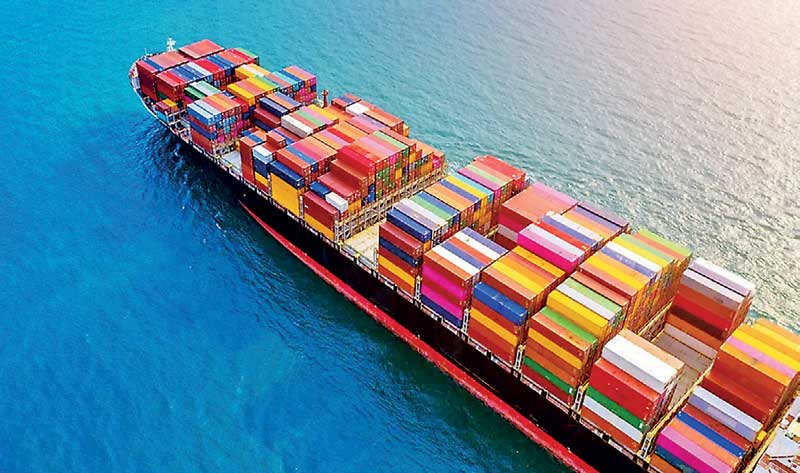Wednesday Feb 18, 2026
Wednesday Feb 18, 2026
Thursday, 26 September 2024 13:53 - - {{hitsCtrl.values.hits}}

Responsible for 3% of global emissions, supply chain professionals must decarbonise shipping through technology-led solutions
Digital tools are reshaping maritime shipping, enhancing sustainability, efficiency and overall operations.
With shipping responsible for 3% of global emissions, technology offers solutions to transform the industry and reduce its environmental impact.
As the shipping industry faces growing pressure to decarbonise, its current emissions levels are cause for concern. Responsible for as much pollution as the entire nation of Germany, shipping is a significant contributor to global carbon output.
If not addressed, its impact could rise to 11% of global emissions by 2050. To keep pace with sustainability goals, shipping must adopt greener strategies – and technology holds the key to this transformation.
Tackling emissions with technology
Cutting emissions is essential for the future of shipping and technology offers practical ways to achieve this. For example, digital technologies can optimise fuel use, improve routes and enhance operational efficiency.
This can directly lower the industry’s carbon footprint, helping to ensure the shipping sector is part of the global decarbonisation effort.
“Shipowners and operators should look to their suppliers for a clear attention to detail, a knowledge of the wider ecosystem and context in which a vessel operates and for technology providers that have the time and resources to properly understand all of the technical idiosyncrasies of a given ship,” explains Cathy Stephenson, MD at Wärtsilä Water & Waste.
With data and advanced analytics at the forefront, shipping companies can harness the power of real-time insights to optimise fuel efficiency, predict equipment failures and reduce downtime.
As a result, these technologies boost not only sustainability but also cost savings and safety.
The Internet of Things (IoT) has emerged as a disruptive tool in this area, allowing shipping companies to monitor cargo conditions and environmental factors in real time.
Sensors track everything from temperature to humidity inside containers, reducing waste and ensuring better quality control. With IoT, shipping becomes more responsive and agile, adjusting conditions as necessary to protect cargo while lowering environmental impact.
Smart tech and green innovations
Shipping is embracing a range of innovative technologies to tackle its environmental challenges.
For instance, alternative fuels like liquefied natural gas (LNG) and hydrogen are gaining traction as cleaner options compared to traditional heavy fuel oil.
These fuels produce fewer pollutants and can significantly reduce a vessel’s carbon emissions.
Other green innovations include:
By reducing the chances of expensive breakdowns and unnecessary repairs, these technologies keep ships running smoothly, with minimal disruption to operations. As a result, shipping companies can cut costs, reduce emissions and extend the lifespan of their fleets. In addition to operational benefits, smart technology enhances communication within the industry. Software applications tailored for maritime operations make collaboration between shipping companies, regulators and port authorities more seamless. This can speed up processes, ensure regulatory compliance and enhance overall safety.
Paving the way for sustainability
Advanced technologies are not just helping shipping firms operate more efficiently—they’re also enabling them to meet increasingly complex international regulations. Automated systems can ensure compliance with environmental standards, trade laws and safety regulations. This is particularly important as regulations evolve to meet global sustainability goals.
AI and cloud technology are being recognised as vital for the future of shipping. These tools offer immense processing power, enabling companies to analyse vast amounts of data and make more informed decisions about everything from route planning to maintenance scheduling. “We’ve seen significant growth in demand for the cloud as businesses continue to evaluate every part of their business, considering opportunities for transformation by technology, data and AI,” says Maynard Williams, Managing Director, UK at Accenture.
As shipping continues to evolve, technology will play a crucial role in driving the industry forward. Embracing digital innovation ensures greater sustainability and gives companies a competitive edge in an ever-changing global trade environment.
Shipping companies that invest in technology are not only improving their bottom line but also contributing to broader environmental and economic progress.
By prioritising sustainability through technology, shipowners can protect both their assets and the environment. Through improved manufacturing processes, enhanced vessel design and the use of smart systems, shipping is becoming more sustainable, efficient and adaptable to future challenges.
(Source: https://supplychaindigital.com/logistics/tech-key-to-modernising-shipping)